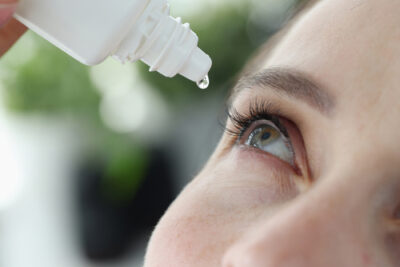Dry eye syndrome is a very common eye condition. Anyone can develop dry eye syndrome, which can be triggered by various things, including hormonal changes and chronic skin conditions.
Dry eyes may also be temporary and simply the result of dehydration, improper contact use, or living in a dry environment. Dry eye syndrome can cause many different symptoms.
Keep reading to learn more about dry eye syndrome, including the symptoms most often associated with the eye condition!
What Causes Dry Eye Syndrome?
One of the most common root causes of dry eye syndrome is poor tear quality. Although it does comprise a significant portion, your tears aren’t made from only water.
Tears have three layers. The inner layer is mucus, the middle layer is water, and the outer layer is oil.
When your tears don’t have enough of one of these components, your eyes can’t get enough moisture and become irritated.

What Symptoms Does Dry Eye Cause?
What does it feel like when your eyes are dried out? Watch out for these common dry eye syndrome symptoms:
Dry or Burning Eyes
A common symptom of dry eye is a dryness or burning sensation. Dry eye syndrome is usually accompanied by and sometimes even the result of inflammation, whether it be inflammation of the eyes or eyelids.
Eyelid inflammation, or blepharitis, often leads to dry eye as it can hinder the glands in your eyelids from producing the oil that creates the outer protective layer of the tear film. As a result, your tears evaporate too quickly, and your eyes don’t get enough moisture from them.
These oil-producing glands are called meibomian glands, and meibomian gland dysfunction is a common cause of dry eye syndrome. Regardless of the cause of your dry eye syndrome, your eyes will likely feel irritated and may also become red.
Itchy Eyes

While dry eye syndrome tends to cause eyes to feel more irritated than itchy, patients with dry eyes may also experience an itching sensation in their eyes. This symptom can be exacerbated by eye allergies, especially if you rub your eyes frequently to try and relieve the itching.
Whether or not you have dry eyes, allergies, or some combination of both, you should avoid rubbing your eyes. Not only does it get more bacteria in your eyes, irritating them more, but they’ll feel even itching may even worsen the more you rub them.
If your eyes feel itchy, use a cool compress over your eyelids and schedule an appointment with your eye doctor. Your eye doctor will be able to determine the root cause of the itching, whether it be allergy-related or due to dry eye syndrome.
Excess Tearing and Mucus in the Eyes
Ironically, dry eye syndrome can cause you to experience increased tearing. This is a natural reaction that your eyes have to irritation.

Many times, increased tearing is due to imbalanced tears. When the eyes aren’t producing enough oil and mucus, the tears are unable to moisturize the cornea.
Instead of staying on the eyes and lubricating them, they begin to fall and run down your face. Poor tear quality is also why you may also have a build-up of mucus around your eyes.
When your tears lack an oil layer, the water in them evaporates quickly, leaving only mucus behind. This build-up can get stuck in your eyelashes and cause your eyelids to stick together.
Although watery and mucus-encrusted eyes can be symptoms of other eye conditions, they are often a sign of dry eye syndrome.
Grittiness in the Eyes
When your eyes don’t have enough moisture, you’ll likely experience a gritty or sandy feeling on the surface of your eye. You may even think that you have an eyelash or something else in your eye, only to find that nothing is there.
This gritty feeling often happens when your eyes aren’t getting enough lubrication.
Difficulty Wearing Contact Lenses
If you’re an experienced contact lens wearer with dry eye syndrome, you may find wearing contact lenses more uncomfortable. Since contact lenses can naturally dry your eyes out, they can exacerbate existing symptoms even when you are adequately performing contact lens hygiene.
Also, wearing contact lenses for too long or without proper contact lens hygiene can trigger dry eye symptoms. The best thing to do if you have dry eyes, whether it’s dry eye syndrome or just temporary dry eye symptoms, is to take a break from contact lenses until your eyes can be treated.
Dry Eye Treatment

If you experience the symptoms listed above, you should see your eye doctor so they can determine the root cause of your symptoms and recommend treatment. In some cases, eye doctors may suggest home remedies before more intensive treatment.
At-home treatments may include warm compresses, nutritional supplements, over-the-counter artificial tears, or using an eyelid scrub. At Sugiki Portis Eye Center, our eye care professionals can guide you through the treatment options while monitoring your condition.
If home remedies don’t alleviate your symptoms, your eye doctor may recommend other treatments. These options may include medication or other therapies like light therapy.
No matter how minor or severe your dry eye syndrome is, we can help you find the proper treatment or combination of treatments to give you the relief you deserve.
Are you experiencing symptoms of dry eye syndrome? Schedule an appointment at Sugiki Portis Eye Center in Honolulu, HI, today!





